Scholar-Practitioner Project: Comprehensive Evaluation Plan
VerifiedAdded on 2023/06/11
|8
|2215
|396
Project
AI Summary
This scholar-practitioner project evaluation plan outlines a comprehensive approach to assessing a wellness initiative, incorporating formative, process, impact, and outcome evaluations. The formative evaluation focuses on the effectiveness of program activities and procedures, utilizing quantitative data collected through observations, questionnaires, and interviews, with an external evaluator providing regular reports. The process evaluation, conducted by both internal and external evaluators, gathers qualitative data to determine if targeted recipients receive the services they need, while maintaining cultural values and adhering to ethical considerations such as confidentiality and voluntary participation. The impact evaluation measures the project's intended causal impacts, using testing, interviews, and questionnaires, with a focus on cultural sensitivity and avoiding harm. Finally, the outcome evaluation assesses whether the project achieved its goals and performance targets, with reports submitted to program partners and health agencies. The overall aim is to foster improvement and development in the project's activities, ensuring effective implementation and the accomplishment of intended objectives.
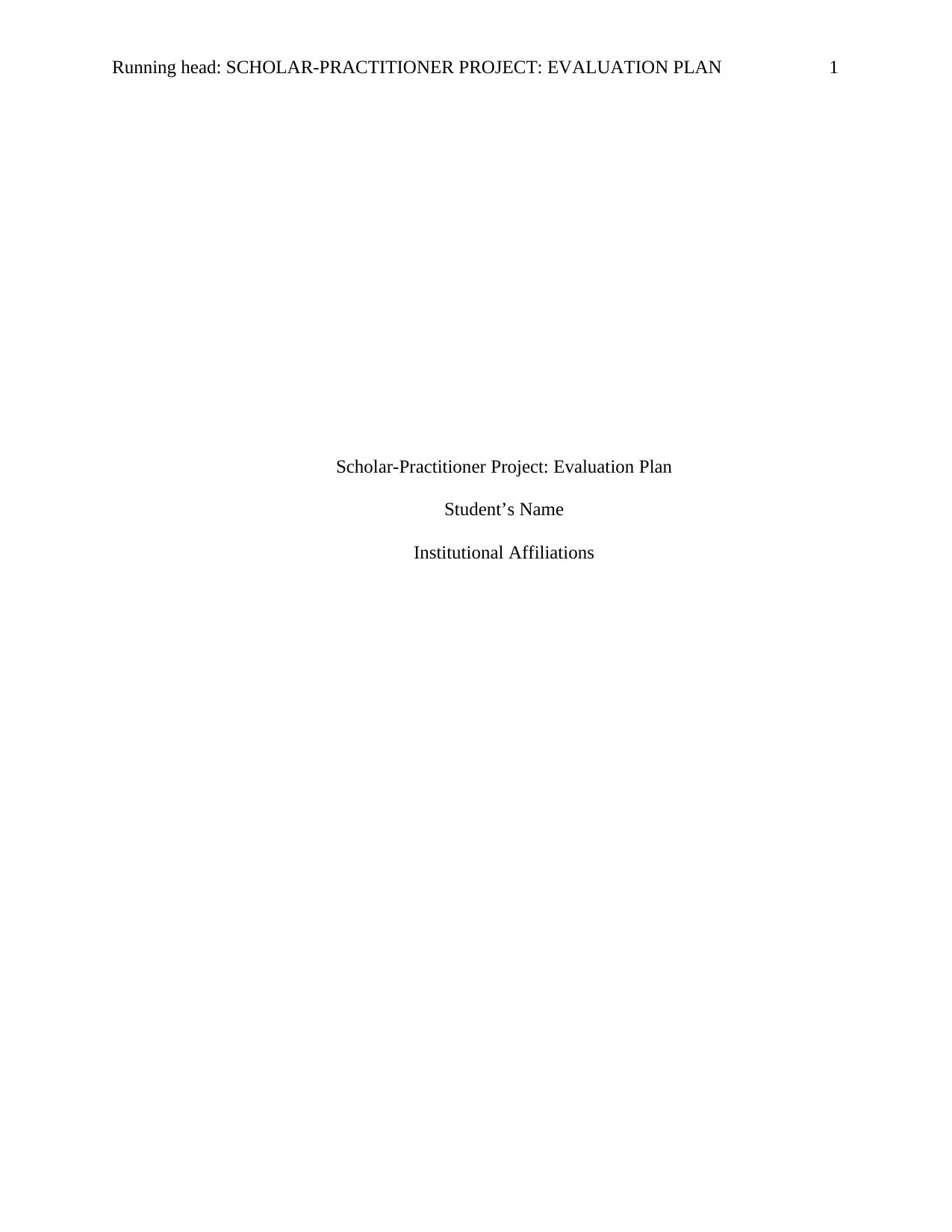
Running head: SCHOLAR-PRACTITIONER PROJECT: EVALUATION PLAN 1
Scholar-Practitioner Project: Evaluation Plan
Student’s Name
Institutional Affiliations
Scholar-Practitioner Project: Evaluation Plan
Student’s Name
Institutional Affiliations
Paraphrase This Document
Need a fresh take? Get an instant paraphrase of this document with our AI Paraphraser
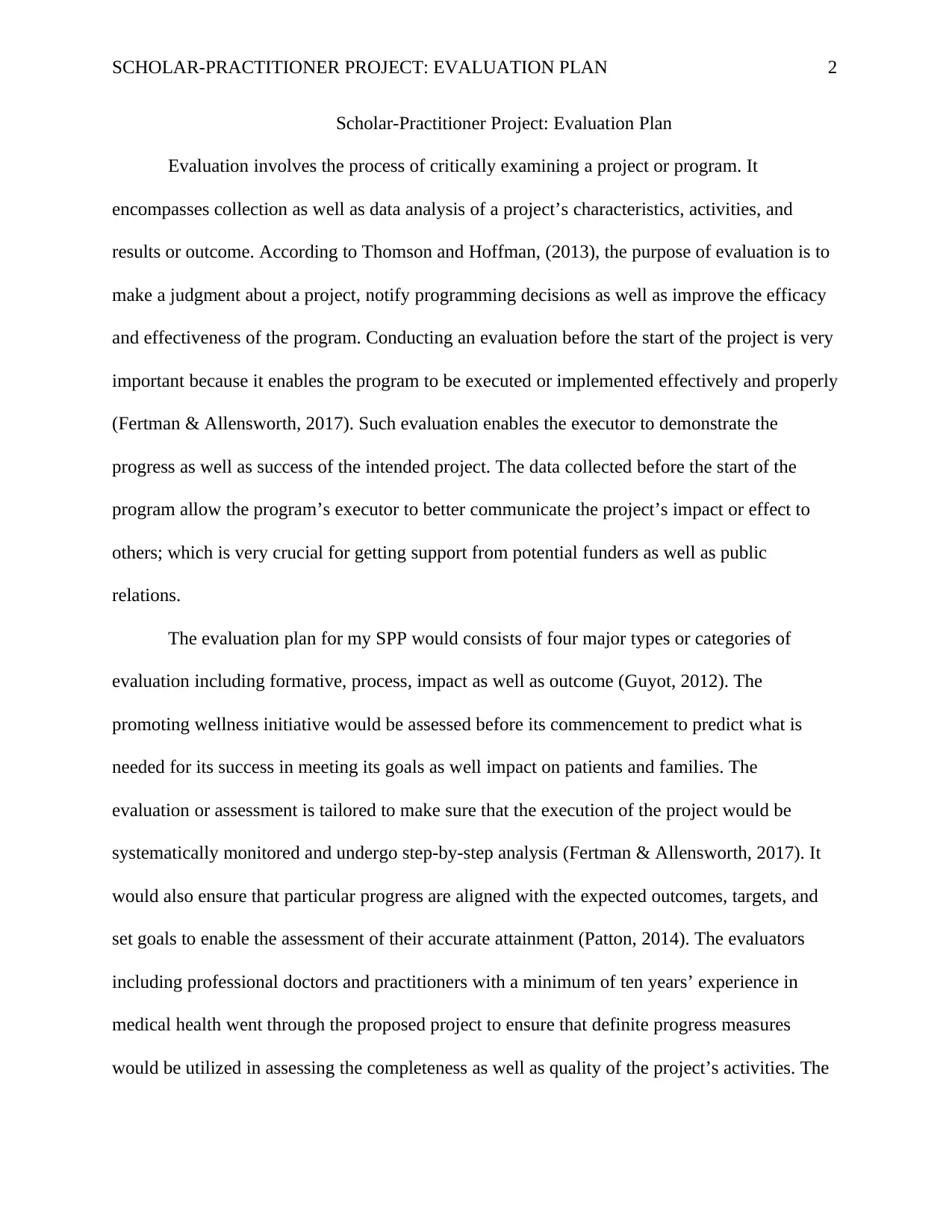
SCHOLAR-PRACTITIONER PROJECT: EVALUATION PLAN 2
Scholar-Practitioner Project: Evaluation Plan
Evaluation involves the process of critically examining a project or program. It
encompasses collection as well as data analysis of a project’s characteristics, activities, and
results or outcome. According to Thomson and Hoffman, (2013), the purpose of evaluation is to
make a judgment about a project, notify programming decisions as well as improve the efficacy
and effectiveness of the program. Conducting an evaluation before the start of the project is very
important because it enables the program to be executed or implemented effectively and properly
(Fertman & Allensworth, 2017). Such evaluation enables the executor to demonstrate the
progress as well as success of the intended project. The data collected before the start of the
program allow the program’s executor to better communicate the project’s impact or effect to
others; which is very crucial for getting support from potential funders as well as public
relations.
The evaluation plan for my SPP would consists of four major types or categories of
evaluation including formative, process, impact as well as outcome (Guyot, 2012). The
promoting wellness initiative would be assessed before its commencement to predict what is
needed for its success in meeting its goals as well impact on patients and families. The
evaluation or assessment is tailored to make sure that the execution of the project would be
systematically monitored and undergo step-by-step analysis (Fertman & Allensworth, 2017). It
would also ensure that particular progress are aligned with the expected outcomes, targets, and
set goals to enable the assessment of their accurate attainment (Patton, 2014). The evaluators
including professional doctors and practitioners with a minimum of ten years’ experience in
medical health went through the proposed project to ensure that definite progress measures
would be utilized in assessing the completeness as well as quality of the project’s activities. The
Scholar-Practitioner Project: Evaluation Plan
Evaluation involves the process of critically examining a project or program. It
encompasses collection as well as data analysis of a project’s characteristics, activities, and
results or outcome. According to Thomson and Hoffman, (2013), the purpose of evaluation is to
make a judgment about a project, notify programming decisions as well as improve the efficacy
and effectiveness of the program. Conducting an evaluation before the start of the project is very
important because it enables the program to be executed or implemented effectively and properly
(Fertman & Allensworth, 2017). Such evaluation enables the executor to demonstrate the
progress as well as success of the intended project. The data collected before the start of the
program allow the program’s executor to better communicate the project’s impact or effect to
others; which is very crucial for getting support from potential funders as well as public
relations.
The evaluation plan for my SPP would consists of four major types or categories of
evaluation including formative, process, impact as well as outcome (Guyot, 2012). The
promoting wellness initiative would be assessed before its commencement to predict what is
needed for its success in meeting its goals as well impact on patients and families. The
evaluation or assessment is tailored to make sure that the execution of the project would be
systematically monitored and undergo step-by-step analysis (Fertman & Allensworth, 2017). It
would also ensure that particular progress are aligned with the expected outcomes, targets, and
set goals to enable the assessment of their accurate attainment (Patton, 2014). The evaluators
including professional doctors and practitioners with a minimum of ten years’ experience in
medical health went through the proposed project to ensure that definite progress measures
would be utilized in assessing the completeness as well as quality of the project’s activities. The
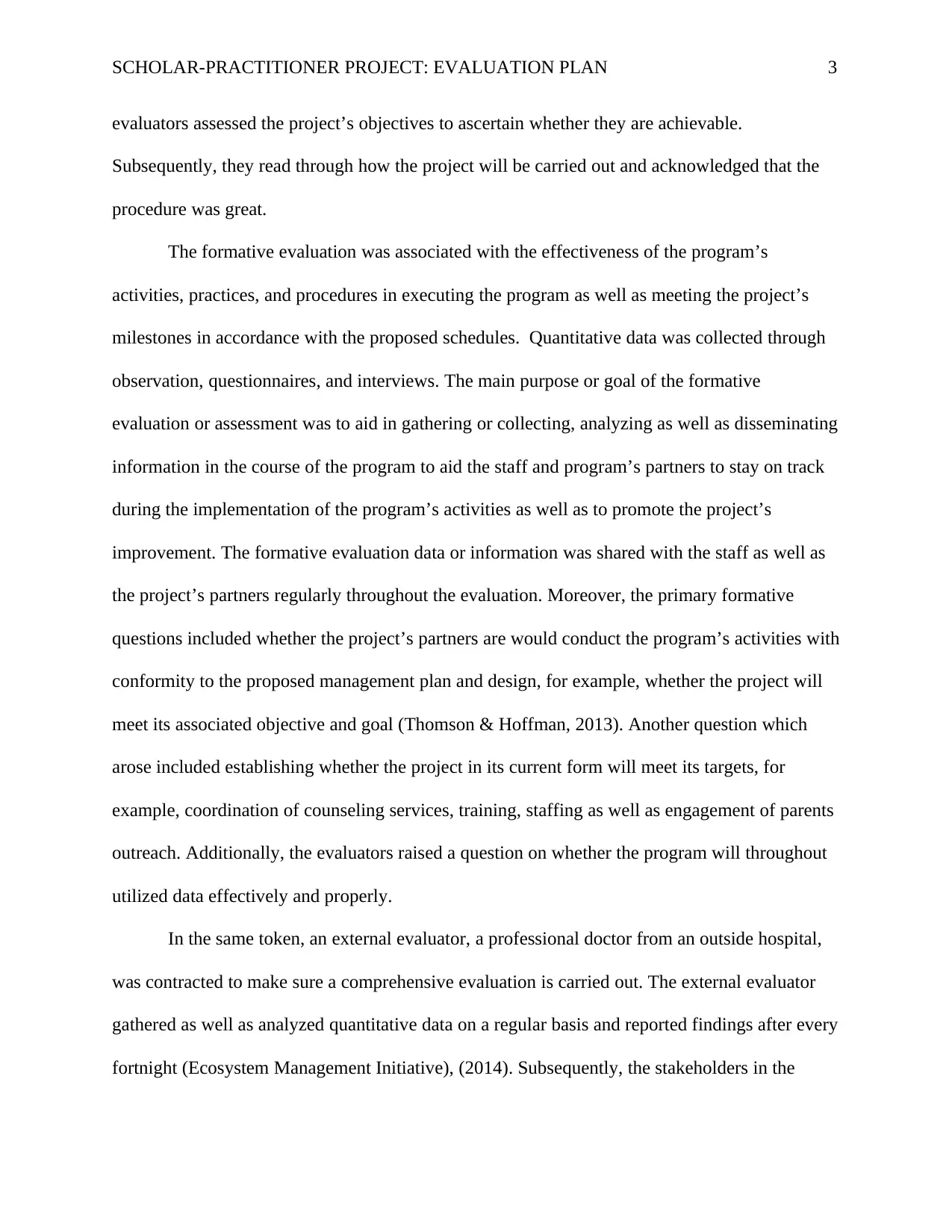
SCHOLAR-PRACTITIONER PROJECT: EVALUATION PLAN 3
evaluators assessed the project’s objectives to ascertain whether they are achievable.
Subsequently, they read through how the project will be carried out and acknowledged that the
procedure was great.
The formative evaluation was associated with the effectiveness of the program’s
activities, practices, and procedures in executing the program as well as meeting the project’s
milestones in accordance with the proposed schedules. Quantitative data was collected through
observation, questionnaires, and interviews. The main purpose or goal of the formative
evaluation or assessment was to aid in gathering or collecting, analyzing as well as disseminating
information in the course of the program to aid the staff and program’s partners to stay on track
during the implementation of the program’s activities as well as to promote the project’s
improvement. The formative evaluation data or information was shared with the staff as well as
the project’s partners regularly throughout the evaluation. Moreover, the primary formative
questions included whether the project’s partners are would conduct the program’s activities with
conformity to the proposed management plan and design, for example, whether the project will
meet its associated objective and goal (Thomson & Hoffman, 2013). Another question which
arose included establishing whether the project in its current form will meet its targets, for
example, coordination of counseling services, training, staffing as well as engagement of parents
outreach. Additionally, the evaluators raised a question on whether the program will throughout
utilized data effectively and properly.
In the same token, an external evaluator, a professional doctor from an outside hospital,
was contracted to make sure a comprehensive evaluation is carried out. The external evaluator
gathered as well as analyzed quantitative data on a regular basis and reported findings after every
fortnight (Ecosystem Management Initiative), (2014). Subsequently, the stakeholders in the
evaluators assessed the project’s objectives to ascertain whether they are achievable.
Subsequently, they read through how the project will be carried out and acknowledged that the
procedure was great.
The formative evaluation was associated with the effectiveness of the program’s
activities, practices, and procedures in executing the program as well as meeting the project’s
milestones in accordance with the proposed schedules. Quantitative data was collected through
observation, questionnaires, and interviews. The main purpose or goal of the formative
evaluation or assessment was to aid in gathering or collecting, analyzing as well as disseminating
information in the course of the program to aid the staff and program’s partners to stay on track
during the implementation of the program’s activities as well as to promote the project’s
improvement. The formative evaluation data or information was shared with the staff as well as
the project’s partners regularly throughout the evaluation. Moreover, the primary formative
questions included whether the project’s partners are would conduct the program’s activities with
conformity to the proposed management plan and design, for example, whether the project will
meet its associated objective and goal (Thomson & Hoffman, 2013). Another question which
arose included establishing whether the project in its current form will meet its targets, for
example, coordination of counseling services, training, staffing as well as engagement of parents
outreach. Additionally, the evaluators raised a question on whether the program will throughout
utilized data effectively and properly.
In the same token, an external evaluator, a professional doctor from an outside hospital,
was contracted to make sure a comprehensive evaluation is carried out. The external evaluator
gathered as well as analyzed quantitative data on a regular basis and reported findings after every
fortnight (Ecosystem Management Initiative), (2014). Subsequently, the stakeholders in the
⊘ This is a preview!⊘
Do you want full access?
Subscribe today to unlock all pages.

Trusted by 1+ million students worldwide
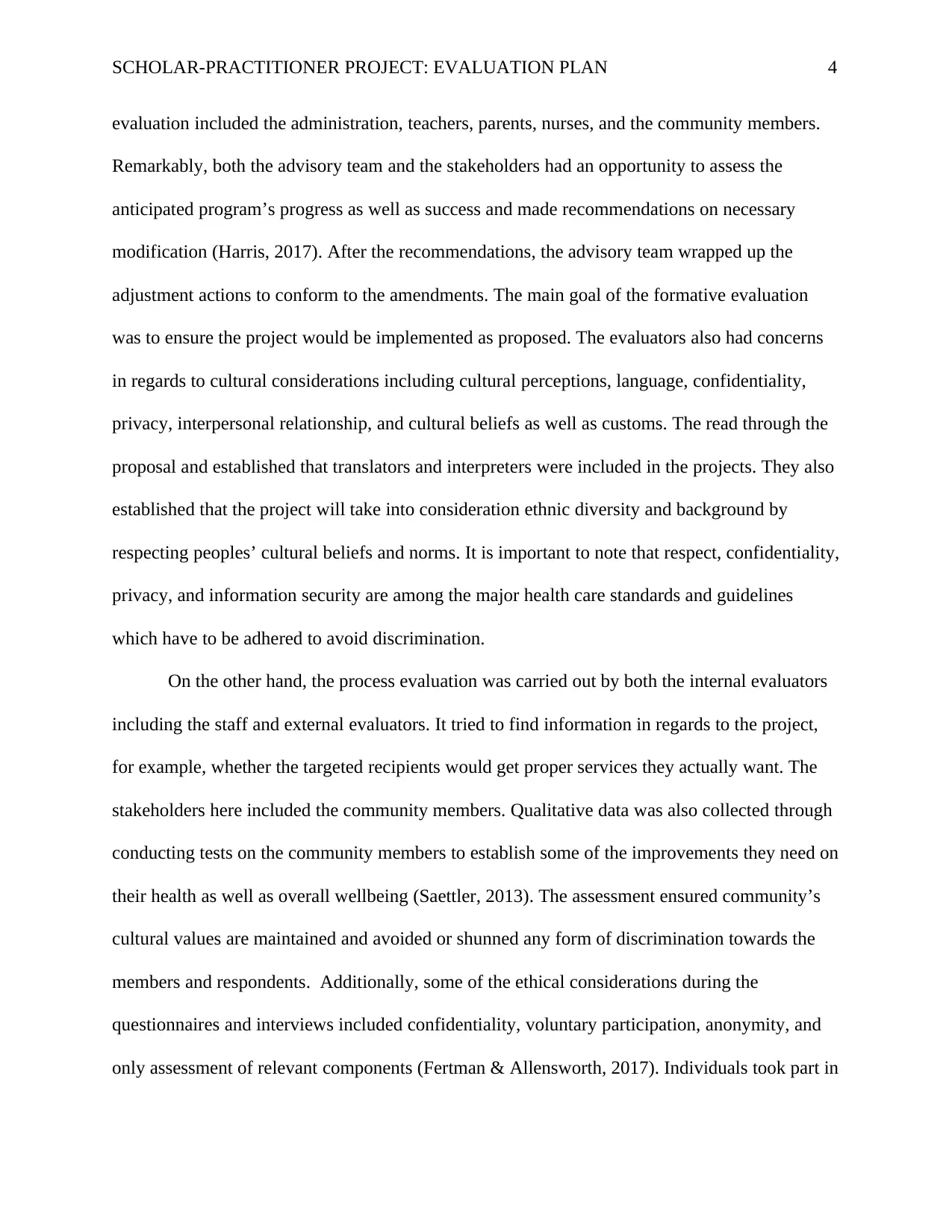
SCHOLAR-PRACTITIONER PROJECT: EVALUATION PLAN 4
evaluation included the administration, teachers, parents, nurses, and the community members.
Remarkably, both the advisory team and the stakeholders had an opportunity to assess the
anticipated program’s progress as well as success and made recommendations on necessary
modification (Harris, 2017). After the recommendations, the advisory team wrapped up the
adjustment actions to conform to the amendments. The main goal of the formative evaluation
was to ensure the project would be implemented as proposed. The evaluators also had concerns
in regards to cultural considerations including cultural perceptions, language, confidentiality,
privacy, interpersonal relationship, and cultural beliefs as well as customs. The read through the
proposal and established that translators and interpreters were included in the projects. They also
established that the project will take into consideration ethnic diversity and background by
respecting peoples’ cultural beliefs and norms. It is important to note that respect, confidentiality,
privacy, and information security are among the major health care standards and guidelines
which have to be adhered to avoid discrimination.
On the other hand, the process evaluation was carried out by both the internal evaluators
including the staff and external evaluators. It tried to find information in regards to the project,
for example, whether the targeted recipients would get proper services they actually want. The
stakeholders here included the community members. Qualitative data was also collected through
conducting tests on the community members to establish some of the improvements they need on
their health as well as overall wellbeing (Saettler, 2013). The assessment ensured community’s
cultural values are maintained and avoided or shunned any form of discrimination towards the
members and respondents. Additionally, some of the ethical considerations during the
questionnaires and interviews included confidentiality, voluntary participation, anonymity, and
only assessment of relevant components (Fertman & Allensworth, 2017). Individuals took part in
evaluation included the administration, teachers, parents, nurses, and the community members.
Remarkably, both the advisory team and the stakeholders had an opportunity to assess the
anticipated program’s progress as well as success and made recommendations on necessary
modification (Harris, 2017). After the recommendations, the advisory team wrapped up the
adjustment actions to conform to the amendments. The main goal of the formative evaluation
was to ensure the project would be implemented as proposed. The evaluators also had concerns
in regards to cultural considerations including cultural perceptions, language, confidentiality,
privacy, interpersonal relationship, and cultural beliefs as well as customs. The read through the
proposal and established that translators and interpreters were included in the projects. They also
established that the project will take into consideration ethnic diversity and background by
respecting peoples’ cultural beliefs and norms. It is important to note that respect, confidentiality,
privacy, and information security are among the major health care standards and guidelines
which have to be adhered to avoid discrimination.
On the other hand, the process evaluation was carried out by both the internal evaluators
including the staff and external evaluators. It tried to find information in regards to the project,
for example, whether the targeted recipients would get proper services they actually want. The
stakeholders here included the community members. Qualitative data was also collected through
conducting tests on the community members to establish some of the improvements they need on
their health as well as overall wellbeing (Saettler, 2013). The assessment ensured community’s
cultural values are maintained and avoided or shunned any form of discrimination towards the
members and respondents. Additionally, some of the ethical considerations during the
questionnaires and interviews included confidentiality, voluntary participation, anonymity, and
only assessment of relevant components (Fertman & Allensworth, 2017). Individuals took part in
Paraphrase This Document
Need a fresh take? Get an instant paraphrase of this document with our AI Paraphraser
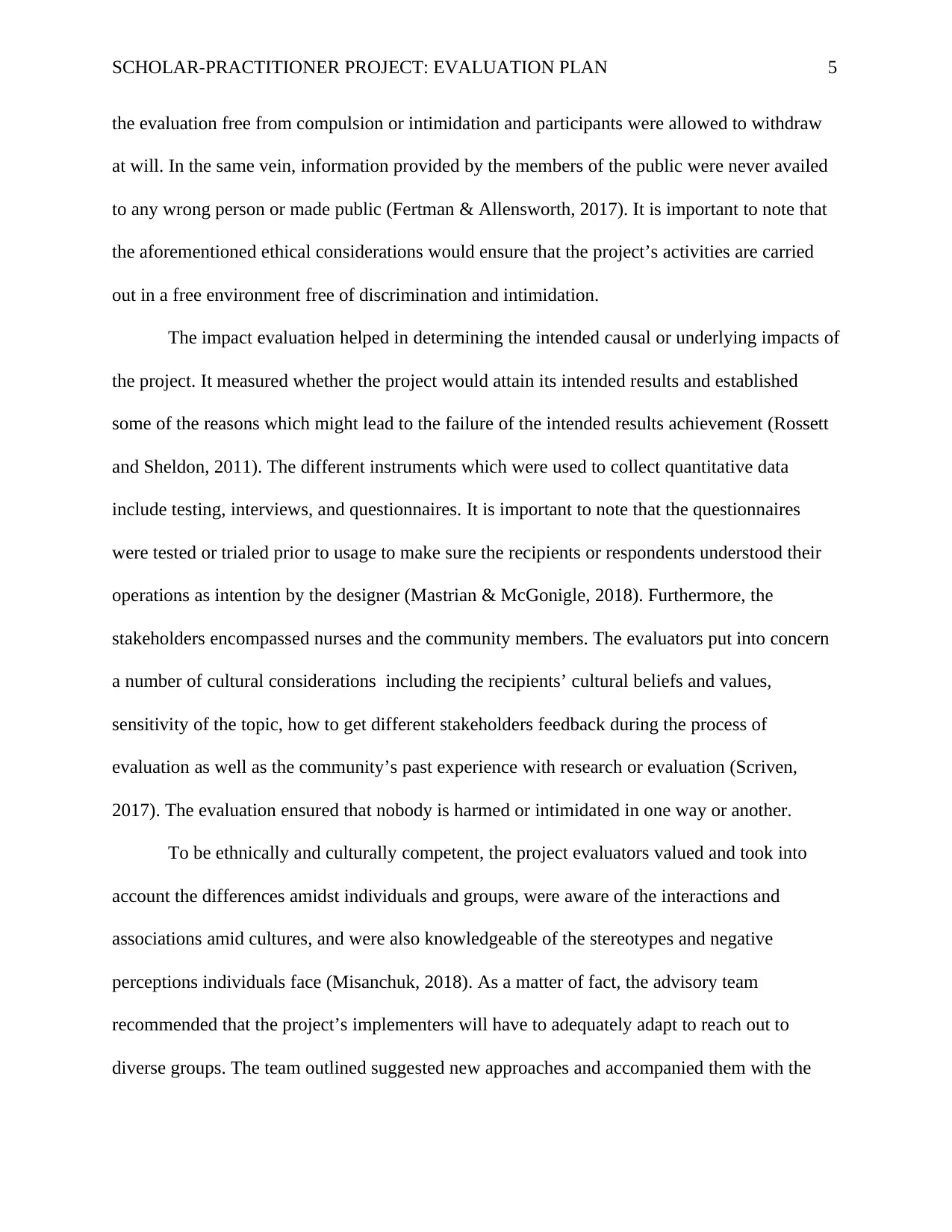
SCHOLAR-PRACTITIONER PROJECT: EVALUATION PLAN 5
the evaluation free from compulsion or intimidation and participants were allowed to withdraw
at will. In the same vein, information provided by the members of the public were never availed
to any wrong person or made public (Fertman & Allensworth, 2017). It is important to note that
the aforementioned ethical considerations would ensure that the project’s activities are carried
out in a free environment free of discrimination and intimidation.
The impact evaluation helped in determining the intended causal or underlying impacts of
the project. It measured whether the project would attain its intended results and established
some of the reasons which might lead to the failure of the intended results achievement (Rossett
and Sheldon, 2011). The different instruments which were used to collect quantitative data
include testing, interviews, and questionnaires. It is important to note that the questionnaires
were tested or trialed prior to usage to make sure the recipients or respondents understood their
operations as intention by the designer (Mastrian & McGonigle, 2018). Furthermore, the
stakeholders encompassed nurses and the community members. The evaluators put into concern
a number of cultural considerations including the recipients’ cultural beliefs and values,
sensitivity of the topic, how to get different stakeholders feedback during the process of
evaluation as well as the community’s past experience with research or evaluation (Scriven,
2017). The evaluation ensured that nobody is harmed or intimidated in one way or another.
To be ethnically and culturally competent, the project evaluators valued and took into
account the differences amidst individuals and groups, were aware of the interactions and
associations amid cultures, and were also knowledgeable of the stereotypes and negative
perceptions individuals face (Misanchuk, 2018). As a matter of fact, the advisory team
recommended that the project’s implementers will have to adequately adapt to reach out to
diverse groups. The team outlined suggested new approaches and accompanied them with the
the evaluation free from compulsion or intimidation and participants were allowed to withdraw
at will. In the same vein, information provided by the members of the public were never availed
to any wrong person or made public (Fertman & Allensworth, 2017). It is important to note that
the aforementioned ethical considerations would ensure that the project’s activities are carried
out in a free environment free of discrimination and intimidation.
The impact evaluation helped in determining the intended causal or underlying impacts of
the project. It measured whether the project would attain its intended results and established
some of the reasons which might lead to the failure of the intended results achievement (Rossett
and Sheldon, 2011). The different instruments which were used to collect quantitative data
include testing, interviews, and questionnaires. It is important to note that the questionnaires
were tested or trialed prior to usage to make sure the recipients or respondents understood their
operations as intention by the designer (Mastrian & McGonigle, 2018). Furthermore, the
stakeholders encompassed nurses and the community members. The evaluators put into concern
a number of cultural considerations including the recipients’ cultural beliefs and values,
sensitivity of the topic, how to get different stakeholders feedback during the process of
evaluation as well as the community’s past experience with research or evaluation (Scriven,
2017). The evaluation ensured that nobody is harmed or intimidated in one way or another.
To be ethnically and culturally competent, the project evaluators valued and took into
account the differences amidst individuals and groups, were aware of the interactions and
associations amid cultures, and were also knowledgeable of the stereotypes and negative
perceptions individuals face (Misanchuk, 2018). As a matter of fact, the advisory team
recommended that the project’s implementers will have to adequately adapt to reach out to
diverse groups. The team outlined suggested new approaches and accompanied them with the
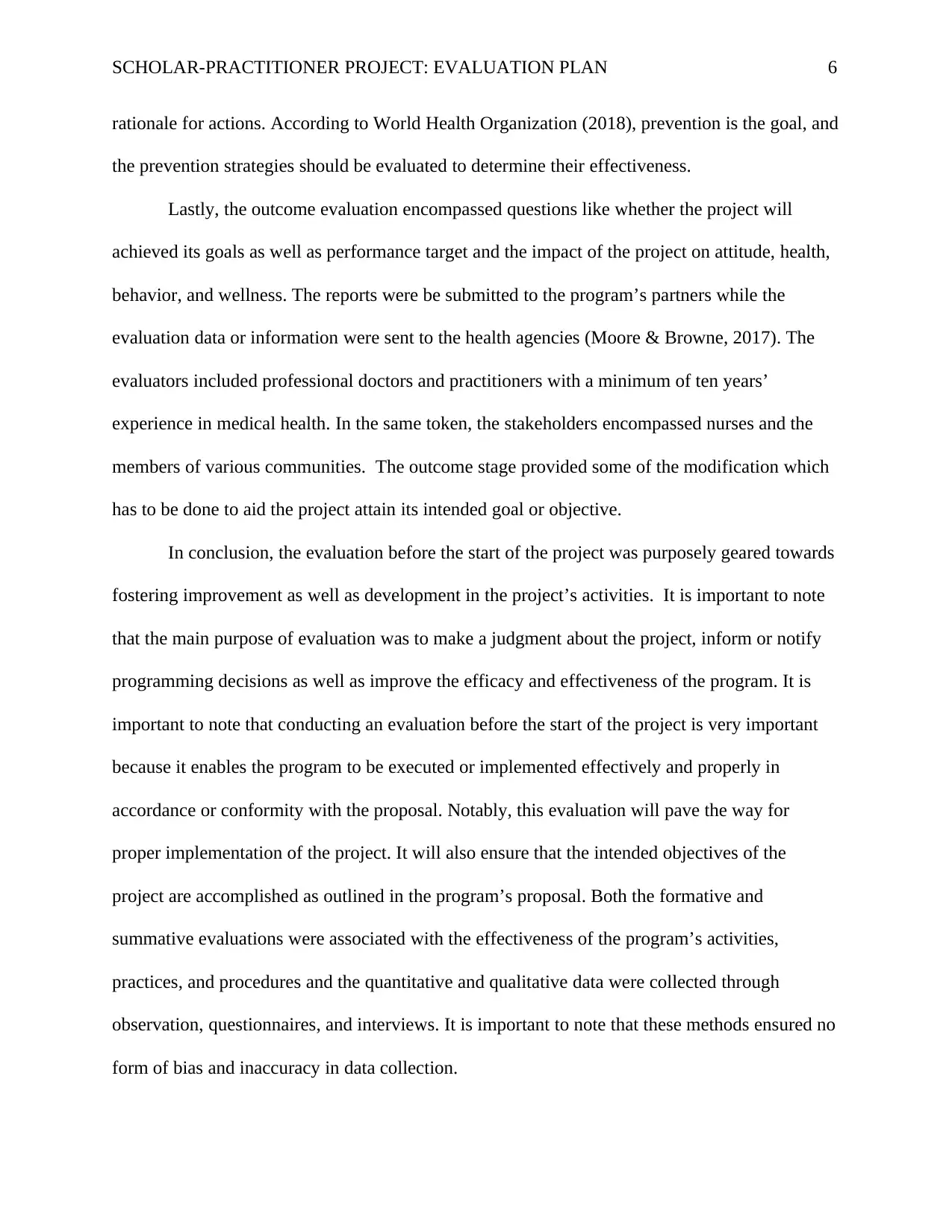
SCHOLAR-PRACTITIONER PROJECT: EVALUATION PLAN 6
rationale for actions. According to World Health Organization (2018), prevention is the goal, and
the prevention strategies should be evaluated to determine their effectiveness.
Lastly, the outcome evaluation encompassed questions like whether the project will
achieved its goals as well as performance target and the impact of the project on attitude, health,
behavior, and wellness. The reports were be submitted to the program’s partners while the
evaluation data or information were sent to the health agencies (Moore & Browne, 2017). The
evaluators included professional doctors and practitioners with a minimum of ten years’
experience in medical health. In the same token, the stakeholders encompassed nurses and the
members of various communities. The outcome stage provided some of the modification which
has to be done to aid the project attain its intended goal or objective.
In conclusion, the evaluation before the start of the project was purposely geared towards
fostering improvement as well as development in the project’s activities. It is important to note
that the main purpose of evaluation was to make a judgment about the project, inform or notify
programming decisions as well as improve the efficacy and effectiveness of the program. It is
important to note that conducting an evaluation before the start of the project is very important
because it enables the program to be executed or implemented effectively and properly in
accordance or conformity with the proposal. Notably, this evaluation will pave the way for
proper implementation of the project. It will also ensure that the intended objectives of the
project are accomplished as outlined in the program’s proposal. Both the formative and
summative evaluations were associated with the effectiveness of the program’s activities,
practices, and procedures and the quantitative and qualitative data were collected through
observation, questionnaires, and interviews. It is important to note that these methods ensured no
form of bias and inaccuracy in data collection.
rationale for actions. According to World Health Organization (2018), prevention is the goal, and
the prevention strategies should be evaluated to determine their effectiveness.
Lastly, the outcome evaluation encompassed questions like whether the project will
achieved its goals as well as performance target and the impact of the project on attitude, health,
behavior, and wellness. The reports were be submitted to the program’s partners while the
evaluation data or information were sent to the health agencies (Moore & Browne, 2017). The
evaluators included professional doctors and practitioners with a minimum of ten years’
experience in medical health. In the same token, the stakeholders encompassed nurses and the
members of various communities. The outcome stage provided some of the modification which
has to be done to aid the project attain its intended goal or objective.
In conclusion, the evaluation before the start of the project was purposely geared towards
fostering improvement as well as development in the project’s activities. It is important to note
that the main purpose of evaluation was to make a judgment about the project, inform or notify
programming decisions as well as improve the efficacy and effectiveness of the program. It is
important to note that conducting an evaluation before the start of the project is very important
because it enables the program to be executed or implemented effectively and properly in
accordance or conformity with the proposal. Notably, this evaluation will pave the way for
proper implementation of the project. It will also ensure that the intended objectives of the
project are accomplished as outlined in the program’s proposal. Both the formative and
summative evaluations were associated with the effectiveness of the program’s activities,
practices, and procedures and the quantitative and qualitative data were collected through
observation, questionnaires, and interviews. It is important to note that these methods ensured no
form of bias and inaccuracy in data collection.
⊘ This is a preview!⊘
Do you want full access?
Subscribe today to unlock all pages.

Trusted by 1+ million students worldwide
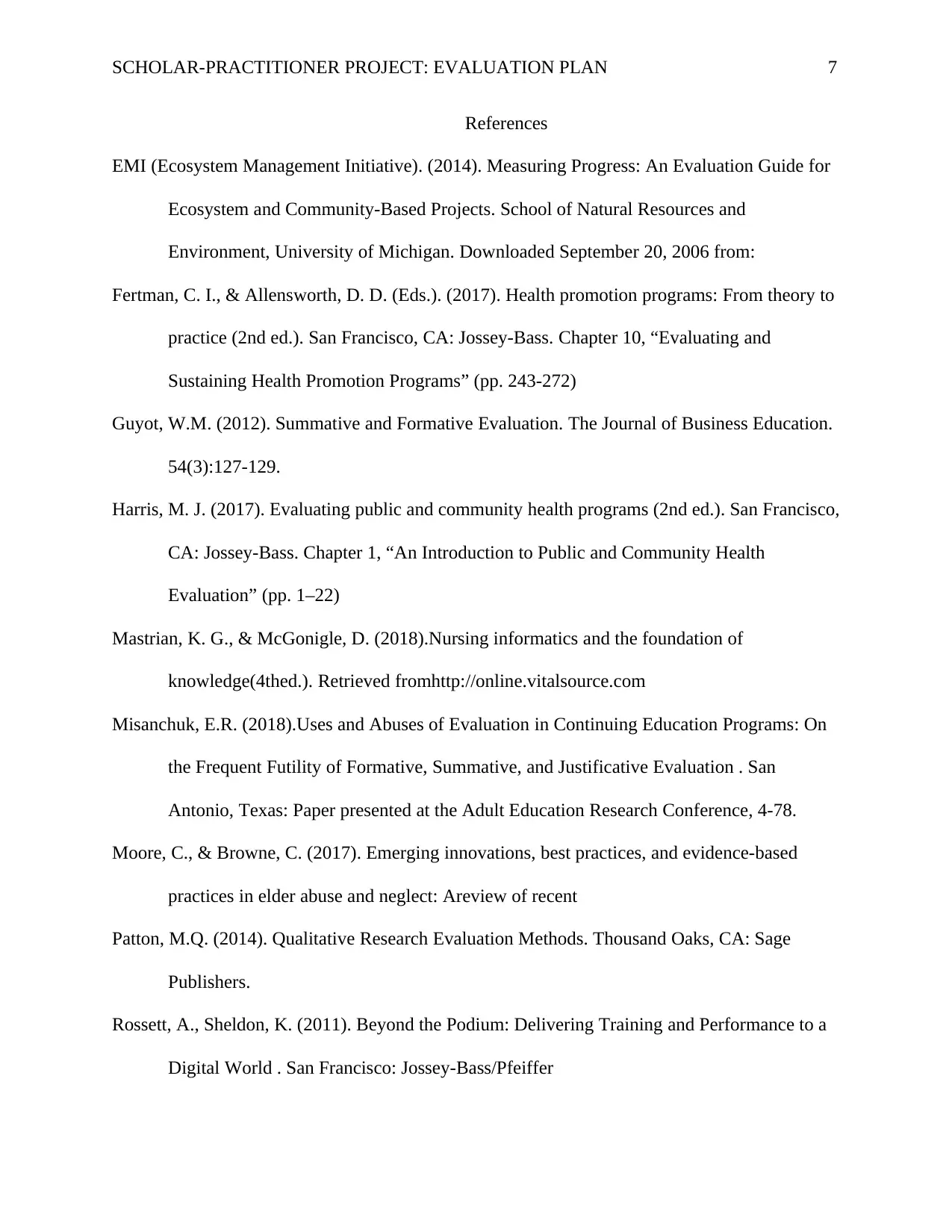
SCHOLAR-PRACTITIONER PROJECT: EVALUATION PLAN 7
References
EMI (Ecosystem Management Initiative). (2014). Measuring Progress: An Evaluation Guide for
Ecosystem and Community-Based Projects. School of Natural Resources and
Environment, University of Michigan. Downloaded September 20, 2006 from:
Fertman, C. I., & Allensworth, D. D. (Eds.). (2017). Health promotion programs: From theory to
practice (2nd ed.). San Francisco, CA: Jossey-Bass. Chapter 10, “Evaluating and
Sustaining Health Promotion Programs” (pp. 243-272)
Guyot, W.M. (2012). Summative and Formative Evaluation. The Journal of Business Education.
54(3):127-129.
Harris, M. J. (2017). Evaluating public and community health programs (2nd ed.). San Francisco,
CA: Jossey-Bass. Chapter 1, “An Introduction to Public and Community Health
Evaluation” (pp. 1–22)
Mastrian, K. G., & McGonigle, D. (2018).Nursing informatics and the foundation of
knowledge(4thed.). Retrieved fromhttp://online.vitalsource.com
Misanchuk, E.R. (2018).Uses and Abuses of Evaluation in Continuing Education Programs: On
the Frequent Futility of Formative, Summative, and Justificative Evaluation . San
Antonio, Texas: Paper presented at the Adult Education Research Conference, 4-78.
Moore, C., & Browne, C. (2017). Emerging innovations, best practices, and evidence-based
practices in elder abuse and neglect: Areview of recent
Patton, M.Q. (2014). Qualitative Research Evaluation Methods. Thousand Oaks, CA: Sage
Publishers.
Rossett, A., Sheldon, K. (2011). Beyond the Podium: Delivering Training and Performance to a
Digital World . San Francisco: Jossey-Bass/Pfeiffer
References
EMI (Ecosystem Management Initiative). (2014). Measuring Progress: An Evaluation Guide for
Ecosystem and Community-Based Projects. School of Natural Resources and
Environment, University of Michigan. Downloaded September 20, 2006 from:
Fertman, C. I., & Allensworth, D. D. (Eds.). (2017). Health promotion programs: From theory to
practice (2nd ed.). San Francisco, CA: Jossey-Bass. Chapter 10, “Evaluating and
Sustaining Health Promotion Programs” (pp. 243-272)
Guyot, W.M. (2012). Summative and Formative Evaluation. The Journal of Business Education.
54(3):127-129.
Harris, M. J. (2017). Evaluating public and community health programs (2nd ed.). San Francisco,
CA: Jossey-Bass. Chapter 1, “An Introduction to Public and Community Health
Evaluation” (pp. 1–22)
Mastrian, K. G., & McGonigle, D. (2018).Nursing informatics and the foundation of
knowledge(4thed.). Retrieved fromhttp://online.vitalsource.com
Misanchuk, E.R. (2018).Uses and Abuses of Evaluation in Continuing Education Programs: On
the Frequent Futility of Formative, Summative, and Justificative Evaluation . San
Antonio, Texas: Paper presented at the Adult Education Research Conference, 4-78.
Moore, C., & Browne, C. (2017). Emerging innovations, best practices, and evidence-based
practices in elder abuse and neglect: Areview of recent
Patton, M.Q. (2014). Qualitative Research Evaluation Methods. Thousand Oaks, CA: Sage
Publishers.
Rossett, A., Sheldon, K. (2011). Beyond the Podium: Delivering Training and Performance to a
Digital World . San Francisco: Jossey-Bass/Pfeiffer
Paraphrase This Document
Need a fresh take? Get an instant paraphrase of this document with our AI Paraphraser
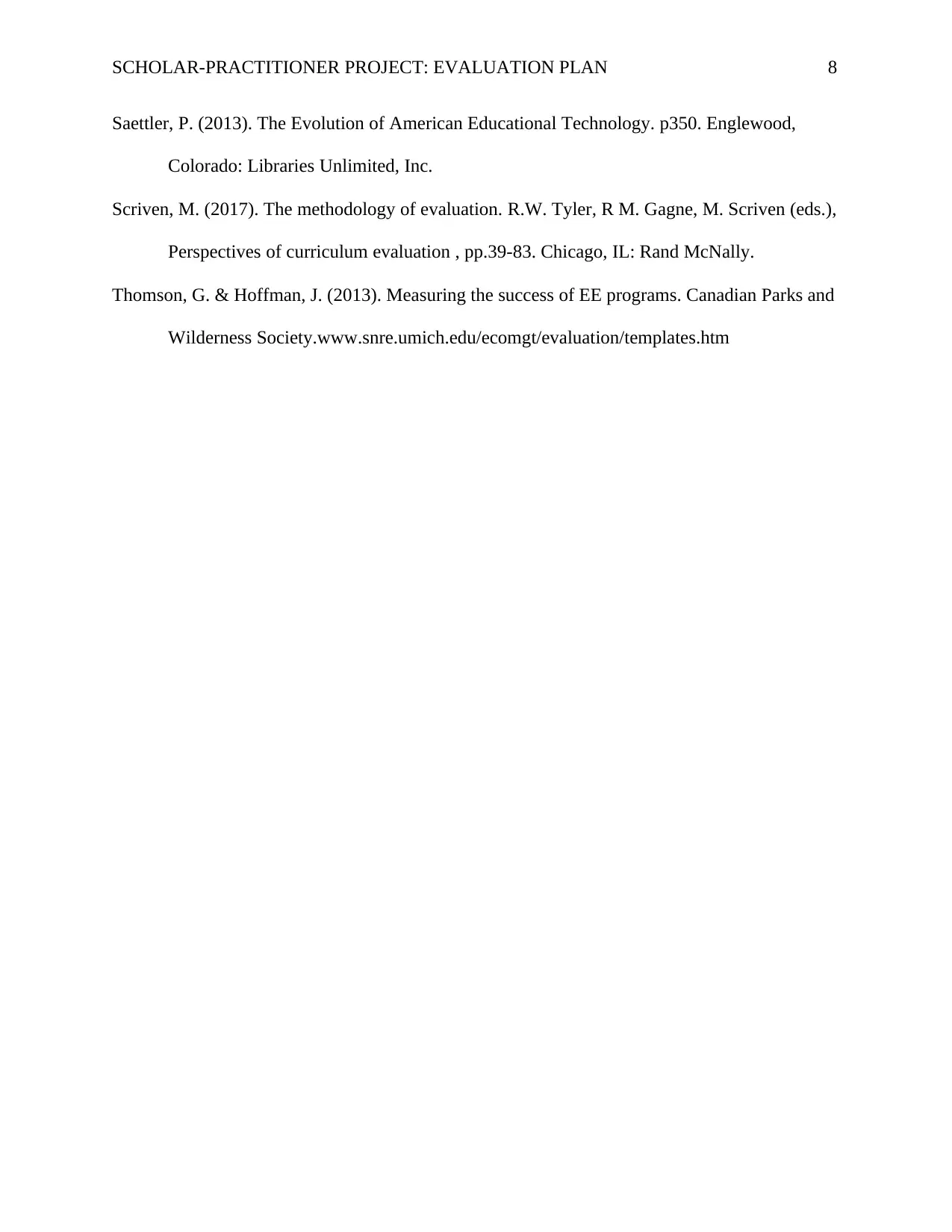
SCHOLAR-PRACTITIONER PROJECT: EVALUATION PLAN 8
Saettler, P. (2013). The Evolution of American Educational Technology. p350. Englewood,
Colorado: Libraries Unlimited, Inc.
Scriven, M. (2017). The methodology of evaluation. R.W. Tyler, R M. Gagne, M. Scriven (eds.),
Perspectives of curriculum evaluation , pp.39-83. Chicago, IL: Rand McNally.
Thomson, G. & Hoffman, J. (2013). Measuring the success of EE programs. Canadian Parks and
Wilderness Society.www.snre.umich.edu/ecomgt/evaluation/templates.htm
Saettler, P. (2013). The Evolution of American Educational Technology. p350. Englewood,
Colorado: Libraries Unlimited, Inc.
Scriven, M. (2017). The methodology of evaluation. R.W. Tyler, R M. Gagne, M. Scriven (eds.),
Perspectives of curriculum evaluation , pp.39-83. Chicago, IL: Rand McNally.
Thomson, G. & Hoffman, J. (2013). Measuring the success of EE programs. Canadian Parks and
Wilderness Society.www.snre.umich.edu/ecomgt/evaluation/templates.htm
1 out of 8
Related Documents
Your All-in-One AI-Powered Toolkit for Academic Success.
+13062052269
info@desklib.com
Available 24*7 on WhatsApp / Email
![[object Object]](/_next/static/media/star-bottom.7253800d.svg)
Unlock your academic potential
Copyright © 2020–2026 A2Z Services. All Rights Reserved. Developed and managed by ZUCOL.





